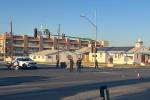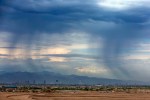North and South
For many Las Vegans, it must be hard to understand or care why the recent retirement of state Sen. Bill Raggio, R-Reno, was regarded as such a momentous event in Nevada politics. After all, what did Raggio do during his 38-year legislative career other than steer millions of tax dollars to the Northern part of the state at the expense of the fast-growing South?
But of course that's exactly the point. For decades, Raggio stood tall as the last remaining obstacle to Southern dominance of the Silver State. He held a practical and symbolic position. On the practical side, he played politics expertly to ensure that Northern Nevada did not unduly suffer as the South's casino colossus grew to epic proportions. As a symbol, Raggio represented the last vestige of a time not so long ago when Las Vegas was merely a blip on Nevada's radar.
Until very recently, Nevada history books focused most of their pages on the events and characters that shaped the cities, towns and mining camps of the North, with Virginia City's Comstock era always taking prominence. A typical example is Richard G. Lillard's "Desert Challenge: An Interpretation of Nevada," published in 1942. This popular history, totaling 384 pages, barely mentions Las Vegas until Page 307, where it is compared with Reno.
"Reno is more the cosmopolis," Lillard wrote. "Las Vegas, a quarter as large, is more the frontier town."
While praising Reno for its efforts to bring cultural amenities to the desert, Lillard poked fun at Las Vegas, which, he wrote, "has no urgent aspirations at all for culture but does label certain things as such. The movies are culture; so are the high school plays and the church cantatas. ... Literature is available for five or 10 cents a copy on the drugstore racks. A radio store carries a music side line of from 10 to 15 Decca swing records. No classical records are obtainable in any store in town."
Three decades later, the great Northern Nevada writer Robert Laxalt was tapped to write a casual state history on the occasion of the nation's bicentennial. His literary ode to the Silver State doesn't focus on Las Vegas until Chapter 14, and his passionate prose is reserved for beloved environments of the North.
And so it went for decades. From the perspective of Reno, Carson City and other Northern communities, Las Vegas was a curiosity hardly worth talking about. It wasn't the real Nevada, where mining moguls, Basque sheepherders and Mark Twain held the limelight.
But when Las Vegas grew into the state's largest city, catching a postwar wave Reno couldn't match, the North's indifference turned into a grab bag of emotions: superiority, insecurity, jealousy, frustration, even fear. How dare this upstart presume to gobble the state's resources, to make demands and draw attention away from the North?
Instead of Las Vegas being ignored, it was vilified as a wasteful, gluttonous and unsophisticated stepchild. To many Northerners, the new kid on the block had not earned a place at the adults' table.
To this day, many Northern residents have refused to come to terms with the fact that the Las Vegas Valley is home to the vast majority of the state's population and generates by far the most economic activity. In part, they've been able to deflect that reality because of Bill Raggio. He always gave the North an air of confidence that its glory days weren't over just yet. If Las Vegas was getting too big for its britches, Raggio would set things right.
Everything changed during last year's election campaign when Raggio, a moderate Republican, endorsed U.S. Sen. Harry Reid, a Democrat, over far-right Republican challenger Sharron Angle. State Senate Republicans reacted by stripping Raggio of his longtime post as minority leader. Although Raggio cited health concerns for his abrupt retirement -- he is 84 -- there's little question he felt frustrated and out of touch with the blustery tea party contingent rising within his party.
Where does this leave Northern Nevada? In bad shape politically. With Raggio finally out of the way, Southern lawmakers -- Republicans and Democrats alike -- are certain to make bolder moves to grab larger hunks of the budget pie. They also will dictate the drawing of new district boundaries, which happens every 10 years to coincide with the census. Raggio had proposed expanding the number of seats in the Legislature -- there are 63 now -- to ensure Northern and rural areas would continue to have adequate representation. His retirement makes that worthy idea much less likely.
This all may sound great to Las Vegans who have little or no interest or stake in the North's fate -- who have donned the haughty posture that the North once wore. But for those who have enjoyed living in both places, and who believe the state's best interests are served by a wide distribution of resources, Raggio's departure is not welcome news. There is no heir apparent.
The North, as a political counterpoint to the enthusiasms and excesses of the South, seems all but dead. Good for Las Vegas perhaps, but not good for Nevada.
Geoff Schumacher (gschumacher@reviewjournal.com) is the Review-Journal's director of community publications. His column appears Friday.























